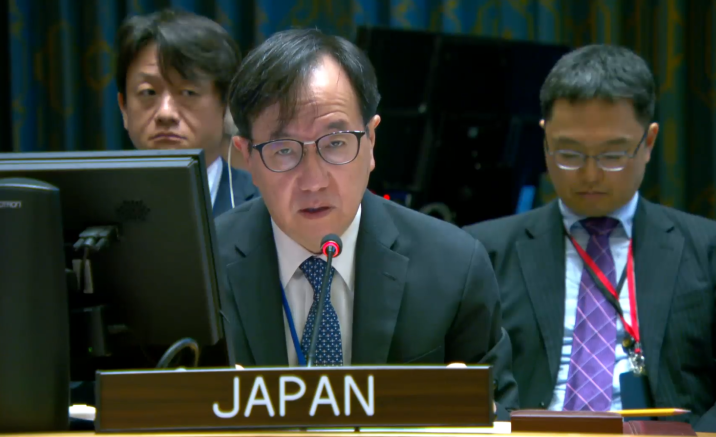Statement by H.E. Ambassador YAMAZAKI Kazuyuki, Permanent Representative of Japan to the United Nations, at the United Nations Security Council Debate on "Maintenance of International Peace and Security: The Role of Women and Young People"
2024/5/28

(As delivered)
Thank you, Madam President.
I welcome Your Excellency back in this chamber, and thank you and Mozambique for convening this important meeting.
I also thank Ms. DiCarlo, Ms. Bahous, Mr. Paullier and Ms. Diouf for their comprehensive briefings.
To empower youth and women as agents of peace and ensure their meaningful participation in peace processes, we must adopt a holistic approach and invest in human capital tailored to their needs.
Japan echoed this point in the Security Council Open Debate on “Promoting Conflict Prevention,” focusing on empowering all actors, including women and youth, during our presidency in March.
Through the debate which had participation from 82 Member States and groups, Japan reaffirmed that holistic approaches on conflict prevention involving women and youth lead to strengthened social resilience and national ownership of sustainable peace.
In this regard, the Secretary-General’s report on YPS emphasizes the need to foster inclusive economic and employment opportunities as a key to youth empowerment in post-conflict settings. Japan fully supports this view and has extended assistance in this area.
For example, following Somalia’s civil war in 2012, limited job opportunities were among the factors that led youth to engage in piracy and join armed rebels.
In response, Japan’s aid agency, JICA, held a workshop in Uganda in 2019, and supported Somali officials and private organizations through 2022, aiming to support local entrepreneurs and small and medium enterprises and to help young people in Somalia to build sustainable businesses and become a driving force for social change. We hope that such post-conflict empowerment initiatives will enable young people to become agents of peace.
Madam President,
Integrating youth and women into security frameworks requires long-term national and international efforts. The international community can draw lessons from the WPS agenda, which has a longer history and many successful cases, to support Member States with the YPS agenda.
Successful elements from WPS frameworks, such as National Action Plans, implementation monitoring, advocacy, and networks, can be adapted for YPS. Japan also trusts that the United Nations Youth Office can play a crucial role in this endeavor.
At the same time, while there are synergies between YPS and WPS agendas, the international community should also address their unique challenges and opportunities in various places and backgrounds.
Madam President,
The Security Council must continue to strengthen and mainstream YPS elements in its resolutions, including in UN field mission mandates, as it has done with WPS perspectives.
It should also consider incorporating youth perspectives into its meetings, including through the invitation of briefers, as the PBC advised for this meeting.
Japan remains committed to enabling the meaningful participation of youth and women in peace processes within and outside the Security Council.
I thank you.
I welcome Your Excellency back in this chamber, and thank you and Mozambique for convening this important meeting.
I also thank Ms. DiCarlo, Ms. Bahous, Mr. Paullier and Ms. Diouf for their comprehensive briefings.
To empower youth and women as agents of peace and ensure their meaningful participation in peace processes, we must adopt a holistic approach and invest in human capital tailored to their needs.
Japan echoed this point in the Security Council Open Debate on “Promoting Conflict Prevention,” focusing on empowering all actors, including women and youth, during our presidency in March.
Through the debate which had participation from 82 Member States and groups, Japan reaffirmed that holistic approaches on conflict prevention involving women and youth lead to strengthened social resilience and national ownership of sustainable peace.
In this regard, the Secretary-General’s report on YPS emphasizes the need to foster inclusive economic and employment opportunities as a key to youth empowerment in post-conflict settings. Japan fully supports this view and has extended assistance in this area.
For example, following Somalia’s civil war in 2012, limited job opportunities were among the factors that led youth to engage in piracy and join armed rebels.
In response, Japan’s aid agency, JICA, held a workshop in Uganda in 2019, and supported Somali officials and private organizations through 2022, aiming to support local entrepreneurs and small and medium enterprises and to help young people in Somalia to build sustainable businesses and become a driving force for social change. We hope that such post-conflict empowerment initiatives will enable young people to become agents of peace.
Madam President,
Integrating youth and women into security frameworks requires long-term national and international efforts. The international community can draw lessons from the WPS agenda, which has a longer history and many successful cases, to support Member States with the YPS agenda.
Successful elements from WPS frameworks, such as National Action Plans, implementation monitoring, advocacy, and networks, can be adapted for YPS. Japan also trusts that the United Nations Youth Office can play a crucial role in this endeavor.
At the same time, while there are synergies between YPS and WPS agendas, the international community should also address their unique challenges and opportunities in various places and backgrounds.
Madam President,
The Security Council must continue to strengthen and mainstream YPS elements in its resolutions, including in UN field mission mandates, as it has done with WPS perspectives.
It should also consider incorporating youth perspectives into its meetings, including through the invitation of briefers, as the PBC advised for this meeting.
Japan remains committed to enabling the meaningful participation of youth and women in peace processes within and outside the Security Council.
I thank you.
